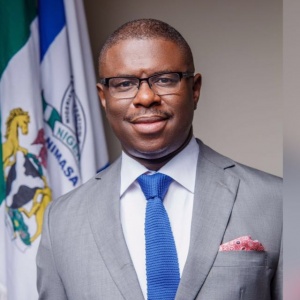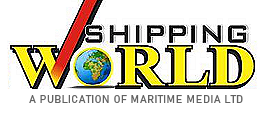
By Asu Beks
A little over three years ago when Dr. Dakuku Adol Peterside was appointed Director General of Nigerian Maritime Administration and Safety Agency, NIMASA, there was a sharp division of what his coming portends.While some believed that he would make a difference, significant and far reaching, there were also those who expressed some level of reservation and indeed pessimism, based on the consideration that not been an industry person would clearly limit his ability to achieve the desirable growth index. Three years down the line, so much has taken place that, without equivocation, can be summed up as the striking gains under Peterside’s stewardship in every parameter, which even his worst critics cannot deny. Overall, he has been able to secure the levers of the maritime domain and gotten the national ship into sea, clearly making Nigeria a true maritime nation, beyond rhetoric and pretensions. Significantly, this new vista of fresh air is couched in indelible and sustainable blueprints as one legacy the President Muhammadu Buhari government could lay firm hold upon as part of its stewardship legacy.For a thorough grasp of these three years’ appraisal, let us take a glimpse at the scope of NIMASA’s mission objectives: administration, operations, oversight, in terms of capacity and economic; control, policy, synergy, diplomacy, public and trade relations.
Administration Beginning from inside outwards, without any gainsaying, staff morale and capacity building remain one of the strongest pillars of Peterside’s achievements. Added to this is stakeholders’ engagement which has so far enjoyed very robust attention. Going hand-in-hand with stakeholders’ synergy is a new improved public relations investment programme. Similarly, the NIMASA helmsman has impacted very positively in raising the bar in trade relations, within and beyond the sub region.The DG of NIMASA has reorganized African Maritime Administration Agencies into a continental shelf with a broad based common ideology and commitment to internal improvement. Various strata of stakeholders are carried along in the bid to open up the industry to accountability and operational responsibility.
Shipping Development and OperationsPeterside inherited a maritime domain that was, even though commercially driven, more or less foreign dominated in terms of coastal and seaborne trade. Effectively, Nigeria’s state flag control status was no less mere official stereotype, since the economic control remained in the hands of foreigners. It was a vintage Peterside who emphasized the need to dialogue with local ship owners on ways to deepen local capacities and strengthen indigenous participation. Thus there has been series of ongoing and robust dialogue aimed at correcting the dislocation of economic participation. Under Peterside, NIMASA has canvassed a number of sustainable indigenous ship development blueprints and promotional strategies as well as establishment of privately run shipping companies, with government support. This option envisages indigenous shipping companies entering into partnerships with established international shipping companies because of a number of inherent advantages. Under the NIMASA template, it is expected that their risk sharing ratio will be 40 – 60 percent ownership while government provides the enabling environment for businesses to thrive.

These are ongoing, aside other strategic plans to provide a wide range of financial support with far less lending ratio burdens supportive of business growth and expansion. Under this option, while it is expected that the foreign shipping concerns will bring their expertise, knowledge of market and operational capacity into the management of the proposed fleet, it is expected that there would be far less profit repatriation overseas with more of the earnings been spent in Nigeria.The option also envisages quicker decision making devoid of usual government bureaucracy. The other option is the PPP model, where government participation will be limited to providing guarantee and offering of confidence to investors against foreign harassment. All of these templates remain the hallmark of Peterside’s stewardship in the past three years.
Promotion of Nigerian Fleet Implementation CommitteeTo achieve above objectives, NIMASA has also faithfully utilized the input of expert presentations to advise the federal government on the need to re-float a national carrier under a short-medium term arrangement for Nigeria to re-enter the international shipping trade, with the prospect of driving a structural and sustainable Economic Recovery and Growth Plan (ERGP), correct the imbalance in Nigeria’s maritime trade; and also seek to increase Nigeria’s chances to significantly raise her GDP. A committee with far reaching and robust terms of reference has since been put in place to further advise the federal government.
NIMASA under Peterside did not stop there. For the success of the proposed indigenous shipping development, the agency has been at the forefront of efforts and recommendations for government to consider a regime of incentives, to be monitored and implemented by the Nigerian Investment Promotion Commission and other relevant agencies.The proposed incentives include zero import duty on vessels; tonnage tax; abolishment of Temporary Importation Permit or imposition of stringent measures, Shipping Sector Support Fund, Real Sector Support Fund -2% per annum /9%, waiver of export tariff for use of Nigerian vessels and Right of First Refusal for National Carriers in the procurement process for cargo and Issuance of Work Permit only upon verification of unavailability of ratings or officers.Others include, Change of Nigeria’s crude oil policy; CAC to adopt FIRS’s zero duty for ship finance registration and Preferential berthing privileges.
Improved Port State ControlRecently, Nigeria’s vessel inspection rating got a boost with 81.7 percent , been a radical departure from her history of recurring lows, with a total of 636 ship inspections last year as against 350 recorded in 2017. Continent wise, South Africa came second with 327 inspections for 2018, while Senegal came third with 270 inspections, during the period under review.A major safety indicator, that rating has clearly put Nigeria on the international trading radar not only as a serious maritime nation, but one whose capacities and potentials is growing under an invigorated administration. Port State Control, PSC, is the instrument used by maritime nations to verify the conditions of foreign ships and their equipment, in the demand for compliance of international requirements and rules.Instructively, above also clearly recognizes improvement in the Nigeria’s Ship Registry being an important component of NIMASA’s function dedicated to generation of revenue for government. As only an inclusive inspection regime can significantly improve the nation’s revenue earnings, these renewed efforts by Peterside remain an affirmation of his commitment to exponentially grow the maritime sector, freeing the sector of it’s hitherto encumbrances through responsible stewardship and leadership direction.
Crude Transportation- Cabotage TradeA man of great resolve and strong political will, since coming onboard, Peterside has committed himself to weeding out all undergrowths detrimental to the growth of the maritime industry. One of such challenge he has had to deal with has been the coastal and inland trade law otherwise known as the Cabotage Act which has remained an hydra headed shipping development monster. The Cabotage Act was designed as an indigenous coastal transportation policy, to pave way for local players in the industry. However, because of the lack of capacity of indigenous players, the Act was passed with a ‘Waiver Clause’ which empowers the transportation minister to grant foreign players powers to take part in the trade.However, since the Cabotage Act was passed in 2003, successive administrations have made brisk businesses of the otherwise noble waiver clause, by constantly undermining local operators and also by substantially sabotaging a policy instrument known as Cabotage Vessel Financing Fund, CVFF, established in 2006, to provide financial window for indigenous ship owners to acquire ships and improve their fleet so as to be able to participate in the Cabotage trade. Sadly, local ship owners were constantly schemed out of the trade using the waiver clause and other convoluted schemes; which steadily led to high level job losses and unemployment.
Disturbed by the high level job loses to foreign concerns through the instrumentality of the waiver manipulation, Peterside took the bold step in 2017 to announce the gradual phase out and suspension of some components of the waiver clause, starting with manning. This created an improved recruitment drive leading to more qualified Nigerians been employed into Cabotage vessels. Encouraged by that change, the Peterside led NIMASA reinforced its Nigerian Seafarers Development Programme, NSDP, to improve and increase the corps of local qualified manpower to take up employment openings in the Cabotage trade.Last year, 2018, Peterside took step further and ordered operators of international oil companies, IOCs, with foreigners onboard to begin a succession plan with indigenous replacement. Again, that strategy worked as these foreign operators began to adapt to the directive, as a precondition to having their waivers renewed.Finally, when NIMASA recently announced the suspension of waivers on manning, it marked the end of a abuse of the special facility and the beginning of a new dawn for Nigeria’s maritime industry, by Nigerians and for Nigerians.
Corporate Social ResponsibilityUnder Peterside, NIMASA for the first time has instituted a corporate conscience programme by reaching out to Nigerians in distress, destitute and the less privileged, through generous donations of essential items and food items. Recently, the agency traversed the length and breadth of this country, reaching out to needy Nigerians directly.

